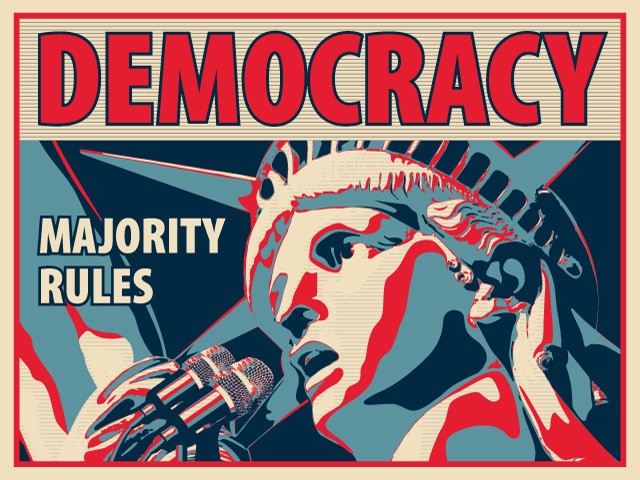The Dilution of Democracy
For a democracy to protect the integrity of its institutions and perpetuate freedom, the people must not only be opinionated. They must be vigilant. Lately, many Democrats have been very vocal in their opposition to voter ID laws. They claim that these laws are designed to be prohibitive to people who are more likely to vote Democrat. Yet these Democrats are silent about the suspicious behavior within the nomination process of the opposing party. Intuitively, this makes sense. Why would they care? They aren’t members of the Republican Party. They disagree with its internal factions, particularly with its far right base – and they stand to politically benefit from that base being suppressed.
However, if we are truly passionate about democracy, we have to preserve the democratic rights of people with whom we passionately disagree. And if Democrats wish to be intellectually honest while invoking that line of thought to persuade people not to support voter ID laws, this same logic should be applicable to the GOP nomination process. Corruption within that process shouldn’t merely concern Republicans – it is relevant to all Americans. Initially, the deliberate weakening of democracy may adversely affect certain participants uniquely, but if left unchecked, it will disenfranchise participants universally.
In the Iowa caucuses, votes from eight precincts “went missing.” Gov. Romney was declared the winner, and this gave him frontrunner status and political momentum in the subsequent New Hampshire primary, which he won. It was later revealed that Sen. Santorum actually had the most votes in Iowa.[i]
At the Republican National Convention, Ron Paul supporters selected in Maine’s caucuses found themselves deprived of their delegate slots by Republican officials. The pro-Paul delegates were substituted with Romney supporters. They left the convention hall in protest.[ii]
Controversial rule changes were proposed that were seen as counter to grassroots interests. A well credentialed Republican delegate characterized the changes as “a power grab by Washington, D.C. party insiders and consultants designed to silence the voice of state party activists.”[iii] One rule that passed granted the RNC the ability to change its rules in between conventions – a time when media attention and resistance would be substantially diminished. This rule was passed by an audible floor vote. CNN reports that the voices “for” and “against” sounded the same, but nonetheless House Speaker John Boehner declared, “The ayes have it.”
Virginia delegates say that they were deliberately delayed when their bus took a random route, leaving the security perimeter three times. They got out and walked, and when they arrived at the committee meeting, it had already adjourned.[iv]
If we accept corruption in this party, at this convention, our civic apathy will encourage future dilutions of democracy. A fair and functional democracy is in the interests of all people who believe not only in their own views but in democracy itself. Instead of “deriving just powers from the consent of the governed,” the dominant two-party system abuses its powers to perpetuate false consensus. We could end this by dissociating ourselves from the parties. If we think that change is impossible, it will be impossible. We become powerless as soon as we accept the permanence of prevailing power.
In a nation that values life and liberty, our government rescinds liberties to protect life, and it sacrifices lives to protect liberty. The two parties balance their opposition to one another by gerrymandering, yet our fundamental ideals are oftentimes improperly balanced. For example, when President Obama signed the NDAA for 2012, he violated the Bill of Rights by authorizing the armed forces to indefinitely detain vaguely defined American terrorism suspects.[v] After Obama’s first year in office, the Associated Press reported that his administration was denying Freedom of Information requests at a substantially higher rate than the Bush administration.[vi]
Both parties have a track record of trampling on freedom. If you believe in the power of your message, you don’t need to wield power to silence other voices. Ballot access laws, the strategic gerrymandering of districts, the exclusion of third party candidates from debates, and the continuing re-rigging of primary and convention processes are all indications that the two parties do not believe in the power of their own messages. How can government serve the interests of all citizens if the processes that are supposed to channel the will of citizens are no longer reputable?
Instead of accepting our status as “disenchanted voters,” we as Americans have another option – the re-enchantment of American ideals. What would that look like? We would break the power of the two-party system by supporting third party candidates, implementing open primaries, and registering as independents. We would be democratic instead of being demagogues. In response to the dilution of democracy and freedom, we would work to ensure that our public policies provide greater freedom.
Instead of telling the LGBT community that their love is not the same, we would acknowledge that freedom exists precisely so that people are able to live differently. Failure to acknowledge the validity of love gives tacit approval to hate. We would legally recognize love and inspire tolerance. True democracy doesn’t deny freedom to people in order to enforce a conformity of lifestyles – that’s what tyranny and socialism does.
Members of the Republican Party correctly observe that deficits are also an impediment to freedom, with a delay disguising the true impact. Prolonged deficits lead to inflation, subjugation to foreign creditors, and oppressive taxes. In a more democratic America, we would avert this outcome by streamlining bureaucracy and modernizing programs. Across the full spectrum of public policy, partisanship would become irrelevant and freedom would be the guiding factor.
We could uphold freedom, and unite around shared values and vulnerabilities, or we could associate ourselves with one of two political parties. We could stay silent during the gradual dilution of democracy, until our destiny is no longer subject to our own determination.
Originally Published on Gen Y Hub: Oct 2012
Resources
[i] http://www.bloomberg.com/news/2012-01-21/rick-santorum-is-declared-winner-of-iowa-caucuses-by-state-party-leaders.html
[ii] http://www.theatlantic.com/politics/archive/2012/08/as-maine-goes-the-ron-paul-movements-last-stand/261767/
[iii] http://www.rlc.org/2012/08/26/a-letter-from-morton-blackwell-to-rnc-delegates/
[iv] http://politicalticker.blogs.cnn.com/2012/08/28/rules-fight-sparks-drama-at-rnc/
[v] http://blogs.villagevoice.com/runninscared/2012/08/ndaa_suit_argue.php








